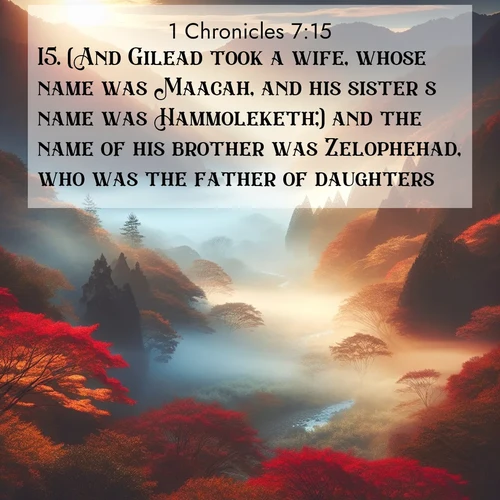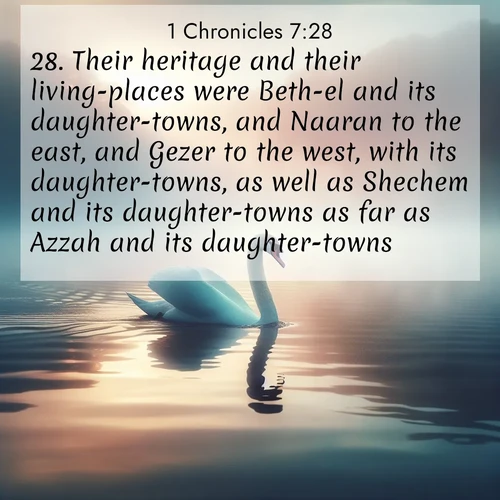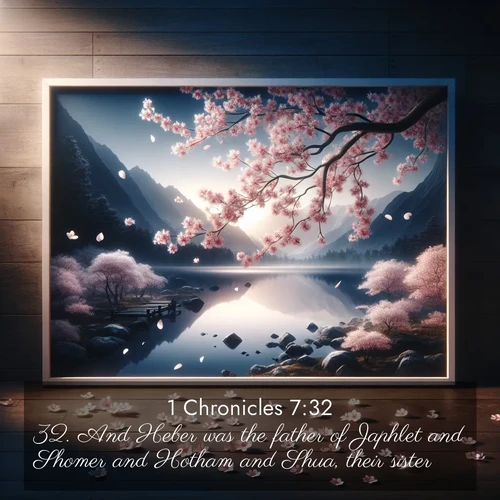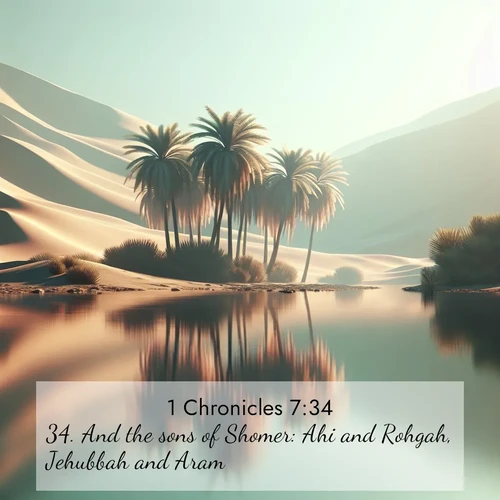Create Basic English Wallpapers: Images for 1 Chronicles Chapter 7 Verses
1 Chronicles 7:1. And of the sons of Issachar: Tola and Puah, Jashub and Shimron, four.
Read the verse in its context:
Basic English 1 Chronicles 7
1 Chronicles 7:2. And the sons of Tola: Uzzi and Rephaiah and Jeriel and Jahmai and Ibsam and Shemuel, heads of their families; they were men of war; in the record of their generations their number in the time of David was twenty-two thousand, six hundred.
Read the verse in its context:
Basic English 1 Chronicles 7
1 Chronicles 7:3. And the sons of Uzzi; Izrahiah; and the sons of Izrahiah: Michael and Obadiah and Joel and Isshiah, five; all of them chiefs.
Read the verse in its context:
Basic English 1 Chronicles 7
1 Chronicles 7:4. And with them, recorded in generations by their families, were bands of fighting-men, thirty-six thousand of them, for they had a great number of wives and sons.
Read the verse in its context:
Basic English 1 Chronicles 7
1 Chronicles 7:5. And there were recorded among all the families of Issachar, great men of war, eighty-seven thousand.
Read the verse in its context:
Basic English 1 Chronicles 7
1 Chronicles 7:6. The sons of Benjamin: Bela and Becher and Jediael, three.
Read the verse in its context:
Basic English 1 Chronicles 7
1 Chronicles 7:7. And the sons of Bela: Ezbon and Uzzi and Uzziel and Jerimoth and Iri, five; heads of their families, great men of war; there were twenty-two thousand and thirty-four of them recorded by their families.
Read the verse in its context:
Basic English 1 Chronicles 7
1 Chronicles 7:8. And the sons of Becher: Zemirah and Joash and Eliezer and Elioenai and Omri and Jerimoth and Abijah and Anathoth and Alemeth. All these were the sons of Becher.
Read the verse in its context:
Basic English 1 Chronicles 7
1 Chronicles 7:9. And they were recorded by their generations, heads of their families, great men of war, twenty thousand, two hundred.
Read the verse in its context:
Basic English 1 Chronicles 7
1 Chronicles 7:10. And the sons of Jediael: Bilhan; and the sons of Bilhan: Jeush and Benjamin and Ehud and Chenaanah and Zethan and Tarshish and Ahishahar.
Read the verse in its context:
Basic English 1 Chronicles 7
1 Chronicles 7:11. All these were the sons of Jediael, by the heads of their families, seventeen thousand, two hundred men of war, able to go out with the army for war.
Read the verse in its context:
Basic English 1 Chronicles 7
1 Chronicles 7:12. And Shuppim and Huppim. The sons of Dan, Hushim his son, one.
Read the verse in its context:
Basic English 1 Chronicles 7
1 Chronicles 7:13. The sons of Naphtali: Jahziel and Guni and Jezer and Shallum, the sons of Bilhah.
Read the verse in its context:
Basic English 1 Chronicles 7
1 Chronicles 7:14. The sons of Manasseh by his servant-wife, the Aramaean woman: she gave birth to Machir, the father of Gilead;
Read the verse in its context:
Basic English 1 Chronicles 7
1 Chronicles 7:15. (And Gilead took a wife, whose name was Maacah, and his sister's name was Hammoleketh;) and the name of his brother was Zelophehad, who was the father of daughters.
Read the verse in its context:
Basic English 1 Chronicles 7
1 Chronicles 7:16. And Maacah, the wife of Gilead, gave birth to a son to whom she gave the name Peresh; and his brother was named Sheresh; and his sons were Ulam and Rakem.
Read the verse in its context:
Basic English 1 Chronicles 7
1 Chronicles 7:17. And the son of Ulam: Bedan. These were the sons of Gilead, the son of Machir the son of Manasseh.
Read the verse in its context:
Basic English 1 Chronicles 7
1 Chronicles 7:18. And his sister Hammoleketh was the mother of Ishhod and Abiezer and Mahlah.
Read the verse in its context:
Basic English 1 Chronicles 7
1 Chronicles 7:19. And the sons of Shemida were Ahian and Shechem and Likhi and Aniam.
Read the verse in its context:
Basic English 1 Chronicles 7
1 Chronicles 7:20. And the sons of Ephraim: Shuthelah and Bered his son, and Tahath his son, and Eleadah his son, and Tahath his son,
Read the verse in its context:
Basic English 1 Chronicles 7
1 Chronicles 7:21. And Zabad his son, and Shuthelah his son, and Ezer and Elead, whom the men of Gath, who had been living in the land from their birth, put to death, because they came down to take away their cattle.
Read the verse in its context:
Basic English 1 Chronicles 7
1 Chronicles 7:22. And for a long time Ephraim their father went on weeping for them, and his brothers came to give him comfort.
Read the verse in its context:
Basic English 1 Chronicles 7
1 Chronicles 7:23. After that, he had connection with his wife, and she became with child and gave birth to a son, to whom his father gave the name of Beriah, because trouble had come on his family.
Read the verse in its context:
Basic English 1 Chronicles 7
1 Chronicles 7:24. And his daughter was Sheerah, the builder of Beth-horon the lower and the higher, and Uzzen-sheerah.
Read the verse in its context:
Basic English 1 Chronicles 7
1 Chronicles 7:25. And Rephah was his son, and Resheph; his son was Telah, and his son was Tahan;
Read the verse in its context:
Basic English 1 Chronicles 7
1 Chronicles 7:26. Ladan was his son, Ammihud his son, Elishama his son,
Read the verse in its context:
Basic English 1 Chronicles 7
1 Chronicles 7:27. Nun his son, Joshua his son.
Read the verse in its context:
Basic English 1 Chronicles 7
1 Chronicles 7:28. Their heritage and their living-places were Beth-el and its daughter-towns, and Naaran to the east, and Gezer to the west, with its daughter-towns, as well as Shechem and its daughter-towns as far as Azzah and its daughter-towns;
Read the verse in its context:
Basic English 1 Chronicles 7
1 Chronicles 7:29. And by the limits of the children of Manasseh, Beth-shean and its daughter-towns, Taanach, Megiddo, and Dor, with their daughter-towns. In these the children of Joseph, the son of Israel, were living.
Read the verse in its context:
Basic English 1 Chronicles 7
1 Chronicles 7:30. The sons of Asher: Imnah and Ishvah and Ishvi and Beriah and Serah, their sister.
Read the verse in its context:
Basic English 1 Chronicles 7
1 Chronicles 7:31. And the sons of Beriah: Heber and Malchiel, who was the father of Birzaith.
Read the verse in its context:
Basic English 1 Chronicles 7
1 Chronicles 7:32. And Heber was the father of Japhlet and Shomer and Hotham and Shua, their sister.
Read the verse in its context:
Basic English 1 Chronicles 7
1 Chronicles 7:33. And the sons of Japhlet: Pasach and Bimhal and Ashvath. These are the sons of Japhlet.
Read the verse in its context:
Basic English 1 Chronicles 7
1 Chronicles 7:34. And the sons of Shomer: Ahi and Rohgah, Jehubbah and Aram.
Read the verse in its context:
Basic English 1 Chronicles 7
1 Chronicles 7:35. And the sons of Hotham, his brother: Zophah and Imna and Shelesh and Amal.
Read the verse in its context:
Basic English 1 Chronicles 7
1 Chronicles 7:36. The sons of Zophah: Suah and Harnepher and Shual and Beri and Imrah,
Read the verse in its context:
Basic English 1 Chronicles 7
1 Chronicles 7:37. Bezer and Hod and Shamma and Shilshah and Ithran and Beera.
Read the verse in its context:
Basic English 1 Chronicles 7
1 Chronicles 7:38. And the sons of Jether: Jephunneh and Pispah and Ara.
Read the verse in its context:
Basic English 1 Chronicles 7
1 Chronicles 7:39. And the sons of Ulla: Arah and Hanniel and Rizia.
Read the verse in its context:
Basic English 1 Chronicles 7
1 Chronicles 7:40. All these were the children of Asher, heads of their families, specially strong men of war, chiefs of the rulers. They were recorded in the army for war, twenty-six thousand men in number.
Read the verse in its context:
Basic English 1 Chronicles 7
The images of Bible verses are created starting from the verses in the Basic English Bible and are made vailable freely for download and use. A link to our website is appreciated to let others know about this free image library. The Bible in Basic English was created in the 1940s by S.H. Hooke, an English language scholar. He wanted to make the Bible accessible to people with limited English, those learning it as a second language, and those with low literacy. To achieve this, he used a simplified vocabulary of just 850 common words, with minimal grammar. This made the text easier to understand, though some argue it loses some of the poetry and nuance of the original. Despite this, it has been praised for its clarity and continues to be used today by many, particularly in education and evangelism. Lausanne AB church is happy to provide the images for free.
NOTE: the images are free to use and share. Please include a link to our site to help others find this resource.








































